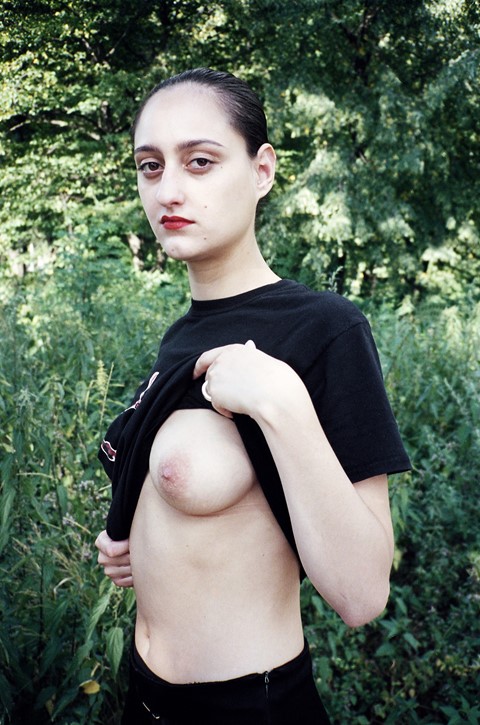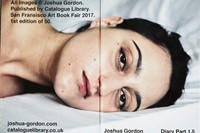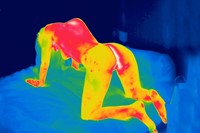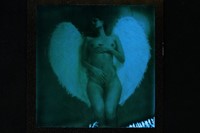In her latest column, Lucy Kumara Moore quizzes Jess Maybury about her modelling work, nudity and photography
SEXNESS is a new monthly column exploring the shape of 21st-century desire from Lucy Kumara Moore, director of Claire de Rouen bookshop. A drive from the deep, a contested ground, a spur to our true identity, desire is manifold. Without aiming to be comprehensive, SEXNESS interweaves conversations with friends and personal perspective, to generate a PLEASURE-POSITIVE transmission from the cultural now.
For this fourth edition of SEXNESS, I wanted to speak to a beautiful and intelligent woman who I first met at my bookshop, Claire de Rouen: the model Jess Maybury.
A few years ago, Jess posed in some pictures for her friend, the photographer Harley Weir. Eventually the images were published as part of Weir’s book Function (released in 2018), which explores the connections between the female body and desire, biology and reproduction in a series of photographs depicting, for example, clusters of hair on areolas, a pregnant belly, a used condom, a baby’s feet, a woman self-pleasuring and childbirth itself. Weir’s photographs portray the female body as constantly and creatively in flux, shifting from soft to hard, small to large, alluring to nourishing, aroused to exhausted. Like an egg – a symbol of fertility which also appears in the book – the female body has an outer object-ness, but also a hidden, inner, formless aspect; messy and yet miraculous.
Weir’s book reminds me of one of my favourite passages of writing on the nature of desire, from English philosopher Gillian Rose’s book Love’s Work. Rose writes of her older female friend, Yvette, who has an intelligence and curiosity that make her seem almost supernatural. She is also a mother and grandmother many times over, and extremely lustful, with drawers full of pornographic magazines in her flat in New York. Rose notes:
“When I remarked one day… that I couldn’t reconcile her grandmotherly identity with her prodigious sexuality, she looked sadly and wisely at me as the one corrupted by unnatural practices: ‘Have you forgotten the connection between sex and children?’”
For me, this passage is a riposte to the notion that a woman’s sexuality ebbs as she ages or enters motherhood. Function works in this way, too. I wanted to talk to Jess about her involvement in the project, and our conversation (on a bad phone line that I have since nicknamed Earth-to-Venus) drifted into other interesting realms, too.
Jess Maybury: I think Function is incredible. The first time I saw all the photos was at the book launch, maybe two or three years after she’d shot me for it and I was blown away. I’d only just started doing nude shoots around the time she shot me for it, it was me with Lily Newmark, Harley wanted us to be breastfeeding each other. I think it was the first time I had met Lily so it was slightly awkward but we were all laughing as Harley wanted more drool and saliva to be glistening in the light but this just meant we were both covered in each other’s spit giggling topless. The photo is amazing, it’s so sensitive and timeless. There’s another photo in Function of just my boobs, with milk running down them – which is incredibly sexual! I remember feeling sexy whilst being shot even though it was in someone’s kitchen with half a pint of semi skimmed milk on the floor [laughs]. The different types of femininity, sexuality and female forms Harley captures reveal her obsession in her work, but also the closeness and trust people have in her, which mean she can capture really vulnerable significant moments.
Lucy Kumara Moore: I find the quality of flux in a female body very beautiful. That comes through a lot in Function. The idea of the body as an amazing machine that can do so many things.
JM: It’s definitely like a machine, with different parts that come together.
LKM: Thinking more broadly, do you think it’s accurate to assume that the naked body is always erotic?
JM: In the context of fashion photography or just all photography?
LKM: Well, in fashion photography, seductive strategies are entrenched – erotic desire has been used to create commodity desire for decades. But in all photography, I think nudity pertains to the erotic. Nakedness is our most honest, animal state, an essential state. And eroticism comes from our primal drives. But maybe I’m being too reductive.
JM: It varies so much, an image can look incredibly intimate, personal and sensual, but behind the camera there are 20 middle-aged men fiddling around with lights, and at other times it might be just one person taking a photograph, and it’s much more intimate and personal. Sometimes you feel more vulnerable in front of lots of people, I’m quite confident, but no one really wants to be in front of all these men changing light fixtures.
LKM: What about the circulation of these images, the way they are seen, and by whom?
JM: I did an editorial shoot with Fran Burns in Naples... Fran always has amazing references, and for this shoot the reference was a book, I can’t remember who it was by, they were black and white photos of a woman who was a prostitute, photos of her – they must have been taken in the 70s or 80s, her just walking around in the street looking incredible.
LKM: Was it Irene (by Roswitha Hecke)?
JM: Yeah that was it! The whole shoot was referenced on that. And then we did one photo where it was me naked, but the magazine in question didn’t use it, I don’t think they often printed nudes but I just found it strange that the basis of the shoot was this incredible woman who was so sexually charged but nudity was excluded from the story.
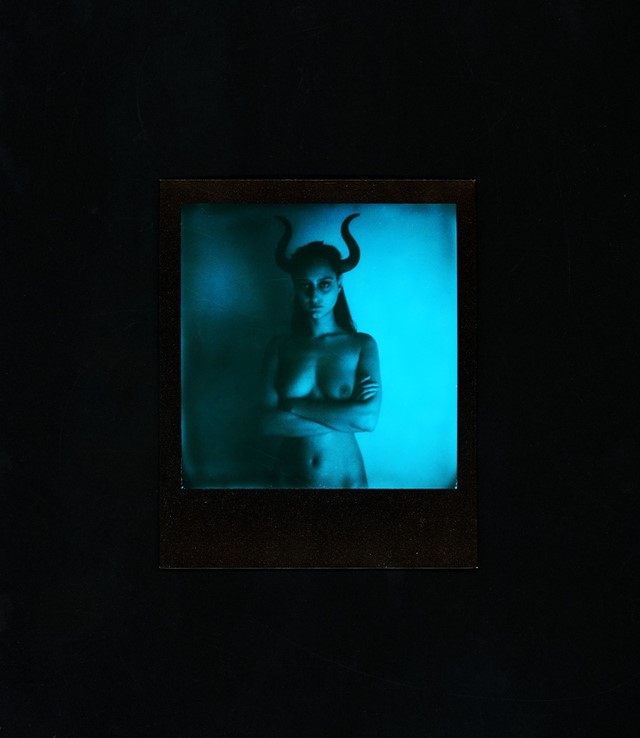
LKM: I guess it’s natural for you to distinguish between commercial shoots and more personal projects – let’s talk about the pictures you take with Joshua Gordon, your boyfriend? Is that process quite collaborative?
JM: He took photos of me from as soon as we met, it’s always been a very natural part of our relationship. We were just hanging out all the time spending days and days and days together, we took photos of each other in a really natural way. I think it’s relevant [that] we got together when it was summer and Josh lived in a room with no windows so we would be naked all day and night – the idea of putting clothes on just to shoot seemed crazy. It’s really sweet looking back now.
LKM: So you took pictures of him too?
JM: Yeah quite often, but they were quite rubbish compared to Josh’s photos. I thought I wanted to get into photography and then I realised I was quite shit at it and I’m not into the technical process of photography.
LKM: I can’t take a good picture at all. What about that shoot you did together for GUT magazine, for the Magic issue, where you pose nude together and you’ve drawn devils horns and tails onto your bodies, it’s funny but it’s also intimate and sexy and free.
JM: Yeah, Josh always likes to shock, so there are often photos of him with his dick out, but you can open almost any magazine and see the naked female form, it’s just not the norm to see nude men as often. We’re doing a shoot together for SLEEK magazine and the theme is influence. We are going to do it about how we influence each other, so we’re doing bizarre photos where it’ll be a naked one of me and a naked one of him, but our faces will be swapped around, we’ll be turning into each other.
LKM: What about the work you’ve done for underwear brands, how do you feel about that? Do you actively enjoy it? Or do you see it as a job you just have to get done? Apparently Rihanna said everyone should pose nude whilst they have the body to do it.
JM: Tyrone Lebon shot the Rihanna Fenty campaign which was really beautiful but behind camera it’s not quite as glamorous. Me and Moffy just smoked and drank at the free bar all day and kept asking the stylist (Mel Ottenberg) for the sluttiest outfits. We didn’t see the point in doing a huge lingerie campaign and not have the most outrageous looks. All the models were amazing, they were all working models but not the usual blond quiet types, everyone had such bold personalities and immense self-confidence. I remember saying to Tyrone, ‘you must be enjoying this job, with all these girls in lingerie’ only to take the piss a bit, but he just replied with how incredibly stressful the whole experience was, I’m sure working for a big brand isn’t the easiest when it comes to creative control.
LKM: What about the difference between being photographed by a man or a woman. Is there one, or is a friendship with a photographer more impactful on the process, regardless of their gender?
JM: Yeah it’s just different once you’ve shot with someone a few times, it’s really easy and natural. So often when you’re on a shoot it’s the first time meeting everyone and there is so much agonising small talk. But when you build friendships with people it becomes such an enjoyable process. Harley and Tyrone are two of my favourite photographers to work with, not just because their photos are incredible but because the process is so interesting and enjoyable. It’s like being shot by a friend rather than someone doing their job. Obviously there are differences being shot by men and women but I think it’s more the exchange between the model and photographer that’s important. What the photographer wants to extract from you and what you’re willing to give. I’ve noticed how willing I am to really immerse myself in a shoot with certain photographers, whereas at other times I feel no connection to a shoot, the concept, the stylist et cetera. I can see in the photos my lack of engagement, but I’m not sure if others are aware of it.
LKM: Earth-to-Venus, I have to go! Thank you Jess, I have loved this conversation.
JM: Thank you!
